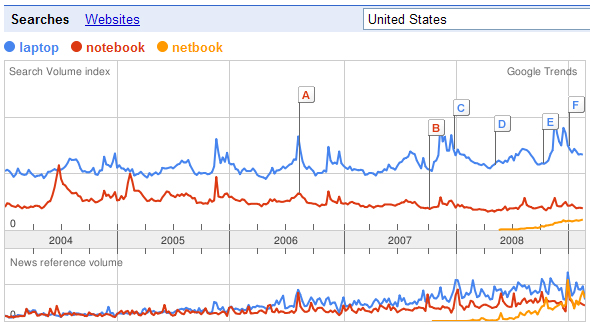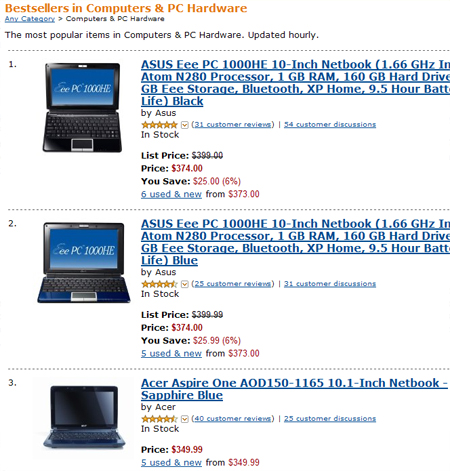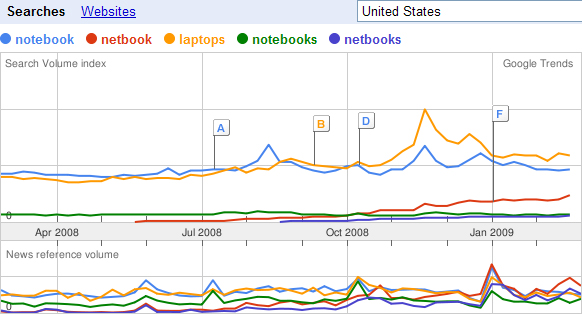We all know that a laptop is a laptop. However, in the wide world of search, you can’t just focus on ranking for laptop. Why? For one, good luck ranking for laptop. The competition is superduper competitive for that term. Next, you’ll probably want to rank for laptops. Again, good luck. Don’t get me wrong. You should definitely optimize your site for those terms. I just don’t want you getting your hopes up. Even in a time of hope and change, I wouldn’t get caught up in hoping that your rankings change so much that you’ll be swimming in $100 bills. It’s just not likely you’ll be able to rank in the top 10 for laptop. But imagine if you could. There are a lot of searches for that term.

Where does that leave us? We must focus on some other generic keywords that also drive a lot of laptop-related traffic. Let’s check out synonyms for laptop. Notebook! Many people refer to their laptop as a notebook, so we definitely need to target the term notebook. Up until a few years ago, that was the main choice as an alternative to laptop. Well guess what. There’s a new keyword on the move: netbook. Just take a look at these historical trends, courtesy of Google Trends:

While the United States search volume has seen a tremendous increase for the term netbook, the News reference volume has been even more dramatic. In the news realm, the term netbook has already passed the volume for notebook, and it looks like netbook and laptop are currently in a dead heat. Where did all of this come from? In Q4 2007 the term netbook appears out of nowhere, and then a year later it’s off to the races. Perhaps a look into the history of netbooks is needed. Or perhaps not. Or perhaps we can borrow a summary from our friends at Wikipedia:
A netbook (a portmanteau of Internet and notebook) is a class of laptop computer designed for wireless communication and access to the Internet.
Primarily designed for web browsing and e-mailing, netbooks rely heavily on the Internet for remote access to web-based applications and are targeted increasingly at cloud computing users who require a less powerful client computer. Netbooks typically run either Linux or Windows XP operating systems rather than more resource-intensive operating systems like Windows Vista or Mac OS X. The devices range in size from below 5 inches to over 13, typically weigh 2 to 3 pounds (~1 kg) and are often significantly cheaper than general purpose laptops.
Netbooks represent a greener alternative to larger laptops due to lower power demands, fewer toxic components, and a resource-efficient approach to computing and some models have achieved EPEAT gold and silver ratings.
The Wikipedia entry goes on about the history of the netbook, from Psion’s line of Netbooks to the One Laptop Per Child project to the Palm Foleo. But the real change in netbook-related search volume came in 2007 when Asus released the ASUS Eee PC. And it wasn’t only ASUS. Everybody had to play catch up and copycat. Following the ASUS EeePC, Everex came out with the CloudBook, MSI developed the Wind, Dell released the Inspiron Mini, HP put out the HP Mini, and many other similar models were on the assembly line for production.
In early 2008, Intel announced that it would be quitting the One Laptop Per Child program, but that didn’t impact search. In fact, in early 2008 the search volume trend for netbook really started to rise. Why might this be? There’s probably many more verifiable and accurate reasons than this one I’m about to throw out there, but I’m going to start with the US economy in 2008. Netbooks are inexpensive, small, underpowered laptops. The key word (no pun intended) in that list is inexpensive. Netbooks average about $350. And just in case you think this post is too long and off base, just check out this link. Today on Amazon, the top 3 bestsellers in Computers & PC Hardware are netbook computers. And there are all under $375. Don’t believe me? Here’s the screenshot:

There you have it. Netbooks are cheap. They are lightweight. They don’t have a lot of the unnecessary bells and whistles that 99% of people will never use. Netbooks are perfect for people who just want to surf the web and check email. In the next few years, netbooks will make it easier for more and more people to get online, and it’s only natural that many of the major companies get involved in the netbook market. Already there are several models from brands such as Acer, Lenovo, Samsung, MSI, Sylvania, Toshiba, ASUS, HP and Dell.

Lastly, here is a look at the terms netbook and notebook vs. the plurals. For those of you wondering, the term netbook has already passed notebooks in terms of search volume. This is another sign that netbook term is only going to become increasingly competitive. If you are running an SEO campaign for a company selling laptops, notebooks and netbooks, I hope you consider placing a lot of focus on netbook-related terms. You are not on the ground floor of ranking for netbooks, but the good news is that you still have a good shot at setting up your site for great netbook-related rankings in the future.